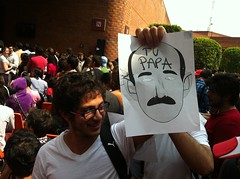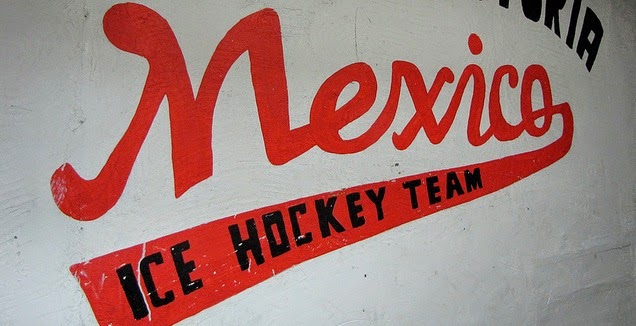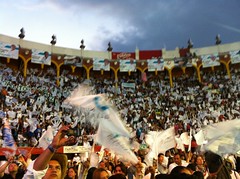
They booed upon Enrique Peña Nieto's arrival at the Universidad Iberoamericana May 11. They screamed, "Out," then, "Out with the PRI," and even, "Killer." When Peña Nieto finished, the assembled students chased after him chanting, "Coward," forcing him to take refuge in a university restroom.
Peña Nieto, former governor of Mexico state, previously canceled twice on the organizers of the event, ironically titled, "Good Ibero Citizen." His reception and rough ride throughout the nearly two-hour encounter explains why.
PRI supporters in the audience clutched signs and applauded, but were drowned out by students covering their faces with masks of former president Carlos Salinas de Gortari – who they allege is the brains behind Peña Nieto. Others held banners invoking controversies such as the 2006 crackdown in Atenco and, "Feminicidios," the unsolved murders of women, which critics allege is worse in Mexico state than Ciudad Juárez – something Peña Nieto denied and said was taken serious by his 2005-2011 administration.
The presidential frontrunner – up by 23 points in the May 11 Milenio-GEA/ISA tracking poll – seemed to take all of the jeers and questions in stride, politely responding, never losing his cool and even addressing questioners by name.
It marked the first public demonstrations of discontent with Peña Nieto, whose campaign had been calm and without incidents – until May 11.
But it also marked an escalation the bitter feud between the PRI and the Mexican left and the emergence of a two-man race between Peña Nieto and López Obrador – with Peña Nieto still miles ahead.
It's a natural polarization: the Mexican left hates Salinas (as do many PAN members not in the Jefe Diego faction of the party) for his privatizations and "neo-liberal policies – not to mention allegedly stealing the 1988 election.
Left-wing candidate Andrés Manuel López Obrador, whose campaign appears to be displacing the PAN for second place, unloaded on Peña Nieto in the May 6 debate and has focused his attacks on the nation's TV industry and the PRI – even though he spent much of the past six years belittling President Felipe Calderón as "spurious" and accusing the PAN president of winning a rigged 2006 election.
Some analysts had said prior to the campaign that López Obrador was aiming for a one-on-one, good-vs-evil showdown with Peña Nieto and the PRI. It appears to be emerging.
For its part, the PRI has accused PRD operatives and an unnamed Ibero professor of sabotaging the appearance – much the way the PAN has accused the PRI of planting people to sabotage appearances by its candidate Josefina Vázquez Mota. (Recall the quesadilla stand fiasco in Tres Marías on the road to Cuernavaca.) Party president Joaquín Coldwell – perhaps oblivious to the allegations of past PRI repression being protested – accused the demonstrators of showing, "intolerance."
The encounter at the Ibero followed a morning of questioning from MVS Radio host Carmen Aristegui, who has been scathing in her assessments of the journalistic practices of Mexico's TV industry.
Peña Nieto – showing a willingness to now face tough audiences after an earlier aversion to controversial circumstances – said he had no special relationships with Televisa, the country's dominant broadcaster. He then went to war with López Obrador for supposedly spending big to become known during his 2000-2005 administration as Mexico City mayor. Peña Nieto complained that the mayor of Mexico City mayor has an unfair advantage since media outlets in the capital are in effect national media outlets. He mentioned López Obrador's early morning press conferences as something unseemly, inferring there was something wrong with a politician smartly scheduling media events for a time that would allow the message to reach a mass audience – free of charge.
Peña Nieto, despite being a little-known provincial politician in 2005, somehow gained better name recognition than that of current Mexico City Mayor Marcelo Ebrard. López Obrador has stated flatly that Televisa is attempting to impose its preferred candidate on the country – and has the power to do so since TV is so influential in Mexico, where more homes have television set than a fridge, according to the last census.
Peña Nieto also denied having any special relationship with Salinas and, oddly, said the same of his old boss, Arturo Montiel, former governor of Mexico state and a man even PRI supporters talk of with distain.
The fallout of the Ibero appearance remains uncertain, along with the media spin. More likely is that the campaign is becoming a two-man race with López Obrador staking his claim as the preferred alternative for those seeking to block Peña Nieto and the PRI.
-- Updates can be found on Twitter: @el_reportero


